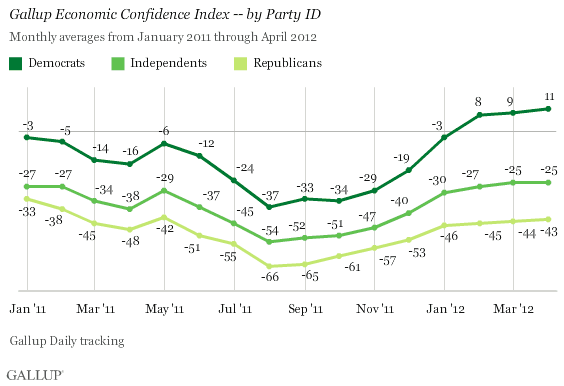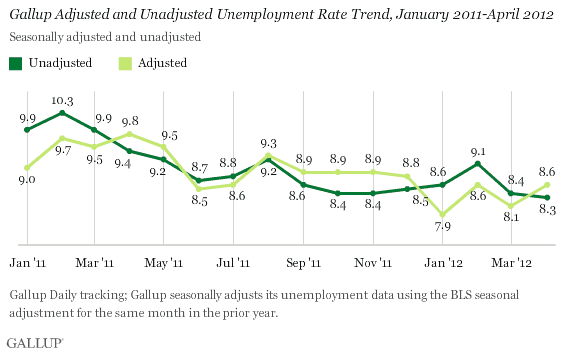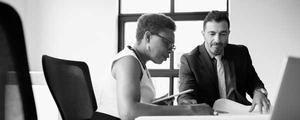For business leaders, economic signs are confusing right now. The U.S. started the year with positive economic news -- particularly, a solid decline in the unemployment rate. But things have become less positive lately. This suggests a slower economy and the possibility that some of the jobs created earlier this year were borrowed from the second quarter, says Gallup Chief Economist Dennis Jacobe, Ph.D.
The economy is growing too slowly to convince most Americans that we're no longer in a recession.
But if senior executives think the economic signals are confusing now, just wait. Things could get even more perplexing and unnerving as the presidential election intensifies, he warns.
Dr. Jacobe isn't necessarily gloomy about the economy overall. But he worries that the "political economy," as he calls it -- that part of the economy that can be influenced by the political discourse in the United States -- could talk itself into even slower economic growth. He suggests that company leaders adopt a clear-eyed view of the potential political and economic issues and seek the real trends in the economy.
Though separating essential economic facts from political assertions will become increasingly difficult in the months ahead, there are underlying behavioral economic factors that executives need to be acutely aware of, Dr. Jacobe says.
For example, far too many people became overly excited about the declines in the unemployment rate earlier this year. Politically, a rapidly declining unemployment rate could mean good things for the president's re-election campaign. It also might mean a change of tactics for the Republicans. The politics seemed to reinforce the better jobs data to produce something of a bandwagon effect, Dr. Jacobe says.
Making business and strategic plans based on solid economic factors is a hard task for many executives, particularly given the mixed economic signals of this presidential election year. Dr. Jacobe's insights in this interview should bring some clarity.
Gallup Business Journal: The economic signals seem mixed, but overall, the U.S. economy appears to be improving. Do you think this improvement will continue?
Dennis Jacobe, Ph.D.: I think there is reason to be positive about the economy moving forward, even if that movement is slow. Gallup's behavioral economic measures show that we're back to about where we were in fall 2008, and that's a big improvement from where we've been. In April, economic confidence was about the highest level we've seen since September 2008. Job creation is about the highest level we've seen since that time. Even consumer spending looks like it is breaking out of the "new normal" spending pattern of 2009-2011. There are many positive behavioral economic signs out there.
However, the economy is growing slowly -- too slowly to produce enough jobs to significantly lower the unemployment rate or to convince most Americans that we are no longer in a recession. The unemployment rate remains far too high. Gas prices are also high even as they are declining. The global economy is slowing, with much of Europe in recession and China slowing down.
Overall, the economic outlook is mixed at best -- but it's also reminiscent of last year, when the economy also started strong but then faded. And I'm worried that the political economy is extremely fragile in this presidential election year.
What do you mean by the "political economy"?
Dr. Jacobe: Far in the past, political science and economics were intertwined. It seems to me that we are heading more in the direction of merging them again, at least in part. Economic disciplines such as public finance and public choice have been doing so for many years. Behavioral economics is merging various aspects of psychology and economics. In this presidential election year, I think we will see much more merging of political science and economics.
Given the fragile state of the U.S. economy, what worries you most about how the political discussion can affect it?
Dr. Jacobe: Gallup's behavioral economics data suggest that Americans' perceptions of the economy have real-world consequences, and that's no surprise. What we also know is that politics often plays a role in how the nation's economic data are interpreted. I guess my major worry is that the political economy will become even more opaque to the nation's business executives in this presidential election year -- and that they'll move even further into a defensive mode than they are already. That is what happened during last year's political battle over raising the debt ceiling.
Can you give an example of how the political economy makes interpreting economic data more difficult?
Dr. Jacobe: One of Gallup's key behavioral indicators involves economic confidence. In March and April, Americans' economic confidence was at its best monthly levels since Gallup began daily tracking in January 2008. This is good news. But when you look at economic confidence by party, you find that Democrats are net positive on the economy, Republicans are substantially negative, and independents are in between. This is a long-standing situation, and since the groups generally trend up or down together, it has not been a concern in the past.
Recently, however, the gap between the Democrats and the Republicans in their views of the economy has been widening. As a result, the movements in the economic confidence data are likely becoming more extreme, and that situation may be exacerbated as we get closer to the election. What this means is that business executives should discount both the highs and the lows in confidence measures going forward this year. Personally, I like to focus on how the independents are rating things.

What about unemployment? Is it affected by the political economy?
Dr. Jacobe: Yes, and I think Friday's unemployment report is a case in point. From a political perspective, there was something for everyone in the more recent Bureau of Labor Statistics [BLS] report. Republicans could point to only 115,000 new jobs being created according to the BLS payroll survey and argue that this isn't enough to take care of normal population growth. Democrats could look at the drop in the unemployment rate to 8.1% in the BLS household survey and say job conditions are getting better. Everyone else could just say April's unemployment results are mixed.
Gallup's unemployment numbers, based on a random sample of about 30,000 Americans a month, show an unemployment rate picture that is much closer to that of the payroll survey. Gallup's data also show an increase in April's seasonally adjusted unemployment rate instead of a decline.

This is important because Gallup's weak unemployment numbers and those of the BLS payroll survey seem to confirm the view that much of the good economic news earlier this year resulted from the unusually warm weather and an early Easter. My view is that business executives should discount those early trends and look for a possible repeat of what happened last year when the economy also seemed to start out strong only to end up fading as it slowed in the second and third quarters.
So my suggestion for business executives is that the BLS household survey results are too volatile to rely on right now. They can look to Gallup's unemployment rate numbers for signals about the unemployment rate. They might also want to consider watching Gallup's measurement of the percentage of Americans working full time for an employer -- a much better measure of the real jobs situation. And they should also look at the BLS payroll numbers because they are a favorite of Wall Street.
What effect do you think the 2012 campaign will have on the political economy?
Dr. Jacobe: The results of the race will have a major impact on the U.S. economy going forward. However, I think the way the race is conducted will also have a major impact. Whatever the economic reality is over the next six months, the political discussion will have a significant effect on consumer perceptions and more importantly, on consumer behavior.
Behavioral economics will be playing a big role because behavioral economics relates to how economic issues are framed and to consumers' perceptions of those issues. Politics tends to heighten and influence the way economic conditions are perceived and projected. So I think the way the election unfolds could have a significant effect on the political economy of 2012.
So political discussion about the economy can have an effect on the economy?
Gallup data suggest that we almost talked ourselves into a double-dip recession last summer.
Dr. Jacobe: Analysts usually say that the state of the economy determines election outcomes. For example, if there's a strong economy, they say it's better for the current president's re-election campaign. But I also think that what politicians and their supporters say plays an important role in how the economy is perceived. If politicians are saying that the economy is heading for a major financial cliff or negative turning point, people will rein in their spending, which will affect all aspects of the economy, including consumer spending, hiring, and unemployment.
Take gas prices, for example. As pump prices surged, they became part of the political landscape. Projections were being made that prices might go to $5 or $6 or even higher. Politicians argue over whether anything can be done. Consumers who see increasing prices and political stalemate might easily conclude they should anticipate paying $5 or more for gas and change their behavior -- pull back on other spending -- in response. Of course, while gas prices remain very high, the declining pump prices of recent weeks seem to have negated this possible economic scenario for now.
Do you think people actually believe anything politicians say about the economy? Or have they become more skeptical over the course of the recession?
Dr. Jacobe: Depending on where you sit politically, your economic views can be affected. So do I think that people are concerned about what politicians say? No. Do I think that an issue can be raised and become more significant to the public in terms of general perceptions because of politics? Yes.
Take the debt ceiling debate, for example. Most people had given the debt ceiling very little thought until it became a heated political debate -- then everybody had a strong opinion about it. While there was no chance the U.S. would default on its debt, some people -- particularly investors outside the U.S. -- started to believe that could be the case. Gallup data suggest that we almost talked ourselves into a double-dip recession when all this took place last summer.
How will this affect the economy moving forward -- or U.S. consumers' perceptions of the economy?
Dr. Jacobe: Looking ahead, there are many similar political issues whose debate -- and possible confrontation -- could potentially affect the economy. For example, the House budget and its attempt to cut entitlements could become a heated debate and could scare all those who depend directly or indirectly on Social Security, Medicare, and Medicaid. Another example might be the many tax provisions that are set to expire after the election. The Bush tax cuts, extension of the payroll tax cuts, the alternative minimum tax, and inheritance taxes all come up for reconsideration in the lame duck Congress that likely will follow the election. However, the debate about these taxes and their potential extension could create a great deal of uncertainty, particularly among small-business owners and investors.
Any final comments?
Dr. Jacobe: First, I'd note that what is happening in Europe may be a good example of how the political economy can make things worse when an economy is under duress.
Second, I think we can expect the U.S. economy to muddle through the remainder of 2012, barring something extreme happening in Europe or the Middle East -- more extreme than the election of the first socialist leader for France in two decades. Given the fiscal and monetary stimulus already in the system -- and the Fed's willingness to provide more if needed -- it is hard to see the economy slowing and entering negative territory from here. And I think the decline in gas prices is helpful. On the other hand, I can't see the economy gaining much positive momentum given all the headwinds we've already discussed.
My advice for the nation's business executives is to avoid getting caught up in all the emotion surrounding the political economy as the presidential election approaches. Try to take a behavioral economics approach to what is happening -- and in how you react -- to what is likely to be a period of even greater and unprecedented economic uncertainty in the months ahead.
Well, it'll be exciting at least.
Dr. Jacobe: Yes. But I think we all would prefer that the economy be a little less exciting right now.
-- Interviewed by Jennifer Robison
